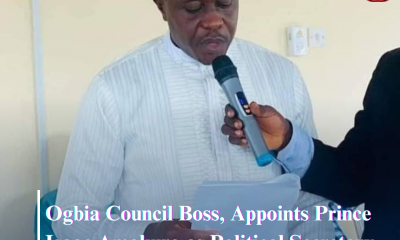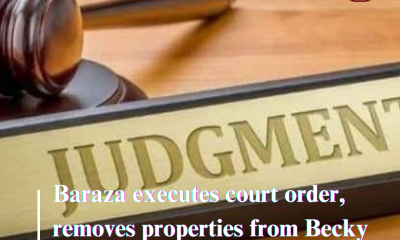Featured
Sanusi’s next move

Sanusi, who departed Awe to Lagos on Friday in company of the Governor of Kaduna State, Mallam Nasir el-Rufai after leading the Jumat services, may chair the 24 convocation ceremony of the Lagos State University.
Justice Chikere had made the order after listening to Sanusi’s lawyer, Lateef Fagbemi (SAN) who argued a motion ex-parte to that effect. The judge’s interim order directed the Inspector General of Police (IGP), Director General of the Department of State Services (DSS), Attorney General of Kano State and the Attorney General of the Federation (AGF) – who are all named as respondents in a fundamental rights enforcement suit filed on March 12, 2020 by Sanusi – to ensure compliance.
Justice Chikere, in the ruling, said: “An interim order of this honourable court releasing the applicant from the detention and or confinement of the respondents and restoring the applicant’s rights to human dignity, personal liberty, freedom of association and movement in Nigeria, (apart from Kano State) pending the hearing and determination of the applicant’s originating summons.”
Earlier, his lawyers had argued that his banishment was illegal. One of them said: “We are of the firm view that this action is illegal and unconstitutional. Section 35 of our Constitution guarantees every citizen the right to personal liberty. The archaic practice of banishment of deposed emirs, a colonial practice, has no basis under Nigerian law or the constitution. We are totally perplexed at the resort to this practice in present day Nigeria by its political leaders.”
Even President Muhammadu Buhari has washed his hands of the action, which has been described as war of attrition in Kano, but the reversal of his banishment by a court order and government’s immediate compliance raised many eyebrows.
Some have argued that though the culture of banishing traditional rulers is archaic, they even stated that it was curious that of all the close to 20 monarchs deposed in the past one and half centuries, like Ooni of Ife, Ogboru, Oba Ovoranwen Nogbaisi of Benin, Emir of Bauchi, Timi of Ede, Abibu Lagunju and Emir of Gwandu, Mustapha Jokolo, Sir, Lamido Sanusi and most recently, Sultan of Sokoto, Ibrahim Dasuki, that of Sanusi came across as one reversed. This, unconfirmed sources said was designed to launch the former emir for fresh responsibilities
Special Adviser on Media to the Kano State Governor, Abdullahi Ganduje, Mr. Salihu Yakassai, had blamed Sanusi’s dethronement on the former emir’s frequent public criticism of the state administration, adding that no government could condone the former emir’s criticisms.
Apart from Kaduna State Governor Nasir el-Rufai, who has given Sanusi two appointments, one as the Vice Chairman of the Kaduna State Investment Promotion Council and Chancellor of Kaduna University since the former emir’s dethronement, all prominent northern elite seemed to have given their support to the government’s action. Not a single protest took place in the Kano Emirate.
Rather, former member of House of Representatives, and a notable critic from the North, Alhaji Tanko-Yakasai suggested that the former Emir got what he deserved for his public criticism: “Emir Sanusi had direct access to Governor Ganduje…but preferred to take to every podium and forum to air his views and criticize the government.”
Indeed, in the past five years, the former Emir, an economist has spoken about educationally, social and economically backwardness of the North and called for action to stop gradual retrogression of the region. Utilising staggering indices from global development bodies he called for the need to invest more in education and population control, stating that neither Islam not culture prohibit productive planning and people-oriented governance. Here are some of his public utterances in this regard.
The North’s self-destruction
At a function on Kaduna State a few months ago, Sanusi said: “If you are a governor in the North, or a leader in the North and if you are seen as normal in the sense that you continue to do what your predecessors have been doing, that has been normalized, then there is something wrong with you because you are part of the problem.
“The real change in the North will come from the moderates, those who are considered mad people because you look around and say you have to say if this is the way we have been doing things, and this is where we have ended up, maybe we will do things differently.
“If you have populated the government with middle-aged men, maybe we need to try younger people; maybe we need to try women. If we had spent our time and money on physical infrastructure, maybe we need to spend more on education of our children; maybe we need to spend more on primary healthcare. If you look at what Nasir el-Rufai is doing in Kaduna, spending 40 per cent of his budget on education that is the only thing that is going to save the North.
“I know that when we say thing things, they don’t go down well. We have been saying this for 20 or 30 years, if the North does not change, the North will destroy itself. The country is moving on. Culture system that people talk about must have a sensor clause.
“The reason people like Nasir stand up and they are nationalist is that they don’t have any sense of inadequacy. You don’t need to rise from Kaduna State or come from the North or be a Muslim to get a job, rather you go with your credentials, your competence, and can compete with any Nigerian from anywhere.
“We need to get our northern youths where they don’t need rely on being from a part of the country to get a job. And believe me there will be a day when there will be constitutional amendment that addresses the issue of quota system and federal character.
“The rest of the country cannot be investing, educating their children, and then they watch us they can’t get jobs because they come from the wrong states, when we have not invested in
the education of our own children.”
Sanusi’s position at Mo Ibrahim Foundation
“Traditional rulers like me find themselves in a very difficult position. On the one hand, politicians are very happy for you to go and fight fires; tell people to keep the peace, preach to people, condemn violence, and on the other hands you are not allowed to criticize the root cause which actually comes from the politicians.
“So it is fine to say to a rural villager, ‘send you child to school,’ but it is not fine to ask the governor ‘why haven’t you built the schools?’ It is fine to talk about the extreme nature of certain interpretation of Islam, but it is not fine to talk about how certain people have been marginalized.
“If you take Nigeria in the 1960s, land per rural dweller was two hectres, today it is 0.9. Agriculture policy still remains far and productivity is lower than the rest of the world. You don’t have food security; you have got millions of children out of school. It is not the fault of the children that they are out of school; somebody is supposed to build those schools.
“To address the issue you have got to address the issue of governance, education, healthcare, corruption and to do that it is now political and that is the difficulty
“UNDI 2015, poverty level in Nigeria is 46 per cent, and it does not look too bad if you compare to other countries, however, if you break this number down, 80 percent a living above poverty line; in the North-West, 80 per cent a living below poverty line. And certainly, it becomes two different countries. As governor of CBN I said people are living below two dollars per day and it sounds bad, but you don’t really know how bad it is until you look into the eyes of a woman whose baby has just died because he cannot afford drugs worth five dollars!
“You look at demographic number and you do not understand demographic explosions until you come to a society where you have a poor man who does not have anything but decides to marry four wives and have 25 children, and you see a complete failure of social policy. Who is talking about marriage? Who is talking about family structure? Who is talking about child-spacing and ability to maintain the children that you give birth to? And this will crowd the resources at stake because we have state governments in the North who have three million, five million children on the street. But they go to china looking for money not to build school but a light rail. Imagine how many schools you can build with that?”
On needs to redefine priorities
At another function he said: “We are mis-defining and misunderstanding our priorities, and we have to be honest with ourselves. I am an economist and I always talk economics and look at the numbers and will look at poverty.
“If you look at the poverty indices in the world today, you will find that in South-West Nigeria, the incidence of poverty is 20 per cent. In the North-West, it is 80 per cent. The North-East, it is 80 per cent. Why is it that the poorest parts of this country are the Muslim parts? Why is it that in a state that started Sharia in 1999…is not the most educated state, in fact, how come that in that state in 2017, only 24 students got five credits at the completion of their secondary school education?
“How do you define Sharia? How do we define Islam? Illiteracy? Malnutrition? Children on the streets? We have to ask ourselves. And we can’t answer those questions until we understand through…that we have to live in this world well in order to serve Allah for the hereafter. For Islam to prosper, we need educated Muslims, we need Muslims that are not begging; we need Muslims you can stand on their feet. Believe me, If poverty continues in the North, Islam will disappear from the North.
“These children that we see and we call them Alumajiri and we laugh, somebody will come, put them in the school, feed them, give them medical care, and convert them to another religion. And they will do that by the hundreds and the thousands. So, what we see on the street is a product of bad economic policies and wrong priorities. These children are not criminals they are victims.”
Reactions
Despite his manifest commitment to national development, his traducers who are uncomfortable with his disposition often refer to his donations in 2013 during his tenure as CBN governor which favoured institutions in the North, against their counterparts in the South. He reportedly donated N4 billion to Bayero University, Kano, N10 billion to Uthman Dan Fodio University, Sokoto and N500 million to the University of Benin, Benin, and N100 million to the Kano State Government.
Also while serving as Emir, there were allegations of non-payment of salaries of palace staff in the face of multi-billion naira renovation of the palace, alleged donation to and support to PDP governorship candidate in the 2019 election, non-attendance of meeting with governor and participation in government activities to rally emirate’s support
While the dethronement has attracted many various comments, a Nigerian senator who does not want to be named said: “Lamido Sanusi has his warts, as do all of us. I’m sure history will exonerate him. Indeed venerate him. For now the feudal system which spawned him spurns him, that system is however doomed. Feudalism is a dead horse. It cannot be wiped back to life. Sanusi was an Emir who came ahead of his time.”
Constitutional lawyer, Chief Mike Ozekhome, (SAN) said “the dethronement and banishment of Sanusi Lamido Sanusi as the Emir of Kano State by the Kano State Government amounts to a clear violation of the fundamental rights of the erstwhile Emir of Kano, as provided for in our Constitution, the African Charter on Human and People’s Rights and Universal Declaration of Human Rights, 1948. Same are subject to being upturned by courts of law.
“Suffering and impoverished Nigerians, who are always at the receiving end of governmental acts of lawlessness and crass impunity, deserve much better than what these governments, from the centre, to the states and local governments, have so far offered them.” Details of Sanusi’s next move remain to be seen.
-

 News3 days ago
News3 days agoFamily, Friends Celebrate Jailed Former Deputy Senate President, Ike Ekweremadu’s Birthday
-

 Niger Delta6 days ago
Niger Delta6 days agoNiger Delta Stakeholders Accuse Olu of Warri and PINL Management of Dishonesty Over Terminated Pipeline Contract
-

 Politics3 days ago
Politics3 days agoPROPHESY TO PRESIDENT BOLA AHMED TINUBU ABOUT 2027
-

 Politics7 days ago
Politics7 days agoOgbia Council Boss, Appoints Prince Isaac Amakuro as Political Secretary
-

 Politics7 days ago
Politics7 days agoRivers’ crisis: Timi Frank to TInubu, APC: Wike’s illegal impeachment plot against Fubara distabilze your administration
-

 News7 days ago
News7 days agoBaraza executes court order, removes properties from Becky father’s residence
-

 Business3 days ago
Business3 days agoBaraza: Bribena pleads for understanding, highlights solutions to organization’s problems
-

 Business6 days ago
Business6 days agoWema Bank Unveils CoopHub, Nigeria’s First Digital Platform for Cooperative Societies




